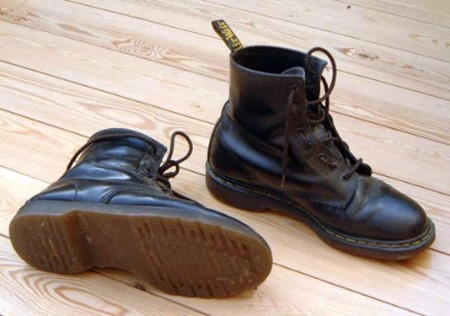|
Delaware Lawyer’s Assistance Program
Miranda D. Clifton, Esq. was recently appointed as Chair of the Delaware Lawyer’s Assistance Program whose mission is to provide confidential assistance to Judges and Lawyers. The program’s goal is to help individuals identify problems affecting their work productivity and/or their quality of life while assisting them in developing effective solution, encouraging health and wellness and professional growth. Issues addressed are alcohol use disorder, depression, substance use disorder, gambling disorder, anger management, stress & burnout, grief & loss, wellness & balance, suicide prevention and lawyer transition.
|
WORKERS’ COMPENSATION LAW
These Boots Were Not
Made For Strapping:
|
 |
|
Claimant filed a Petition to Determine Compensation, alleging injuries to her cervical spine and left shoulder from picking up a box at work. The Employer disputed that an accident occurred and resulted in injury. Claimant asserted, in the alternative, that an implied agreement as to compensation existed due to the payment of medical bills.
The Board noted claimant delayed reporting for more than two weeks during which time she was working in a physically demanding job (folding large boxes of clothes after they came off trucks), a store manager rebutted her testimony about reporting earlier, and a co-worker testified that during the two-week period, she worked without complaint and never mentioned an injury. The initial medical records did not even document a work accident or injury. After the incident was reported weeks later, the records were changed to point to a work-related mechanism of injury. Two of the doctors who made the changes didn’t testify about why they made the changes. The evidence also suggested that claimant had pre-existing neck and left shoulder problems. She was diagnosed with cervical radiculopathy in the weeks before the alleged accident. All of the above caused the defense medical expert, Dr. Schwartz, to question the veracity of claimant’s history. The Board shared those concerns. The Board also noted that claimant changed the accident dates, and never provided a reasonable explanation for that. She failed to cooperate with the insurance adjuster’s investigation. Therefore, she was unable to meet her burden of proof generally.
The Board rejected claimant’s attempts to bootstrap this very questionable claim with an “implied agreement” theory, based on the payment of four small medical bills. Three of the bills were paid by a medical only adjuster, at a time when the adjusting team was very short-staffed. The Board accepted testimony from the adjuster ultimately assigned to the file that the bills were paid based on a mistaken legal conclusion that bills could be paid without any impact on the denial. The Board noted that all other actions taken by the carrier were consistent with the denial of the claim. Therefore, the bills were not paid under a “feeling of compulsion” necessary to establish an implied agreement under Delaware Supreme Court authority in Tenaglia-Evans and Andreason.
Should you have any questions, please contact Maria Paris Newill, or any attorney in our Workers’ Compensation Department.
Trincia v. Dick’s Sporting Goods, IAB #1505228 (Jan. 20, 2023).
|
|
LITIGATION LAW UPDATE
No Gold for Insurance Company at the End of This Rainbow . . . or Should we Say Fire: Insurance Company Cannot Subrogate Against Its Own Insured
|
 |
|
The Superior Court granted Defendant’s Motion for Summary Judgment following an updated analysis of the Sutton Rule. In this case, Defendant was alleged to have negligently started a fire at Baytree Apartments, where she was a tenant, resulting in $4 million in damage to twenty-four apartment units owned by Sovereign Property Management, LLC and insured by GuideOne National. GuideOne paid the insurance loss and then filed suit against the tenant as subrogee of its insured owner.
The Sutton Rule, which was adopted by Delaware courts in Lexington Insurance Company v. Raboin, sets forth the basic presumption that tenants are “co-insured” with their landlord under the landlord’s fire insurance policy such that the insurance carrier cannot obtain subrogation from its own insured. However, specific terms of a tenant’s lease agreement could shift the risk of loss to the tenant, but only when clearly spelled out in the lease. The Court confirmed that the Sutton Rule is the presumption and the burden lies with the insurer to demonstrate that a different result was bargained for in the lease.
The Court here went on to analyze several different lease provisions discussing various insurance obligations, responsibilities for fire loss, as well as a surrender clause and ultimately concluded that no such provision clearly expressed an intent to contradict the Sutton Rule. Defendant’s motion for summary judgment was granted.
GuideOne National a/s/o Sovereign Property Management, LLC v. Mary Albert, C.A. No. N21C-06-006 CEB (Del. Super. January 27, 2023)
|
|
EMPLOYMENT LAW
Plaintiff Fails to Exhaust Administrative Remedies Leading to Case Dismissal
|
 |
|
Plaintiff filed a Complaint against Defendant alleging that Defendant violated the Americans with Disabilities Act (“ADA”). Plaintiff alleges he was discriminated against on the basis of an alleged disability, and he was terminated.
To prove a case under the ADA, a plaintiff must show that (1) he is a disabled person within the meaning of the ADA; (2) he is otherwise qualified to perform the essential functions of the job, with or without reasonable accommodations by the employer; and (3) he has suffered an otherwise adverse employment decision as a result of discrimination.
In this case, the Plaintiff failed to include any factual allegations in his Complaint. The Plaintiff did not set forth any facts to explain how Defendant discriminated against him on the basis of an alleged disability and how that led to him being terminated. Therefore, Defendant filed a motion to dismiss.
In evaluating a motion to dismiss, the Court is required to accept as true all material allegations in the Complaint. The Complaint must contain more than conclusions, a plaintiff must plead facts sufficient to show that a claim has substantive plausibility. The Court found, in this case, that Plaintiff did not meet that burden. Further, the Plaintiff was required to exhaust the administrative remedies before filing the Complaint in federal court. The Plaintiff should have filed an action with the Equal Employment Opportunity Commission (“EEOC”) first and allow them to investigate and pursue the matter. After 180 days, a claimant may elect to circumvent the EEOC procedures and seek relief through the court. In this case, the Plaintiff received a” Notice of Right to Sue” letter from the Delaware Department of Labor and not from the EEOC. As such, the Court concluded that the Plaintiff failed to exhaust her administrative remedies and the Defendant’s motion to dismiss was granted.
Should you have any questions regarding this decision, or any liability law questions, please contact any attorney in our Liability Law Department.
Lowe v. Goodwill Industries., 2023 WL 2306735 (D.Del., 2023)
|
Celebrate Good Times
We are thrilled to celebrate with Lisa Bailey who said “I do.” on Friday March 3rd. Lisa and her husband Don were married at the Wilmington & Western Railroad. We wish you many years of happiness!
|
|
|







